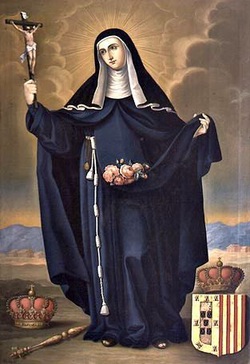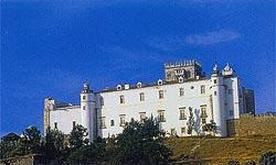
As a wife, she gave herself up as much to the education of her children, as to her own improvement, striving in all ways, next to God, to please her husband. For nearly half the year, she was used to live on bread and water, and once, when she was ill, God changed the water into wine, which the physicians had ordered her to drink, but which she was unwilling to take. Once when she kissed a disgusting ulcer in a poor woman, it was immediately healed. One winter-time when she was giving some money to the poor, and was fain her husband should not see her alms, the coins changed into roses. She gave sight to a maiden who had been born blind, and healed many other persons of grievous sicknesses by the Sign of the Cross. The miracles of this kind, which she worked, were many. She not only built, but richly endowed convents, schools, and churches. She had a wonderful skill in making peace between kings, and toiled unweariedly to lighten all suffering, whether public or private.
King Denis died and Elisabeth, who in her maidenhood had been a pattern to virgins, and in her married life to wives, now, in her loneliness, was an ensample to widows. Clad in the raiment of the nuns of St. Clare, she faithfully attended at the King's funeral, and soon after went to Compostella, where she offered many precious gifts, of silk and gold, and silver, and precious stones, for the benefit of his soul. Thence she returned home, and spent in holy and godly uses everything that remained to her that was dear and costly, eager to relieve every kind of suffering. She lived, not for herself, but for God, and to be useful to mankind. She finished the convent for nuns, right worthy of a Queen, which she had founded at Coïmbra. She fed the poor, defended widows, protected orphans. A war being lighted up, between her son Alphonsus IV, King of Portugal, and her grandson Alphonsus XI, King of Castile, she resolved to set out to reconcile them, and went to the famous city of Estremoz. On the journey she caught a violent fever, of which, after a vision of the Virgin Mother of God, she died a saintly death on the 4th day of July, in the year 1336. She became illustrious for miracles after her death, especially for the sweetness of the savour of her body, which hath now remained uncorrupt for well-nigh three hundred years, and she hath always been spoken of as the Holy Queen. At length, in the year of our salvation 1625, which was that of the Jubilee, Urban VIII, all Christendom gathered together and approving, formally enrolled her name among those of the Saints.





